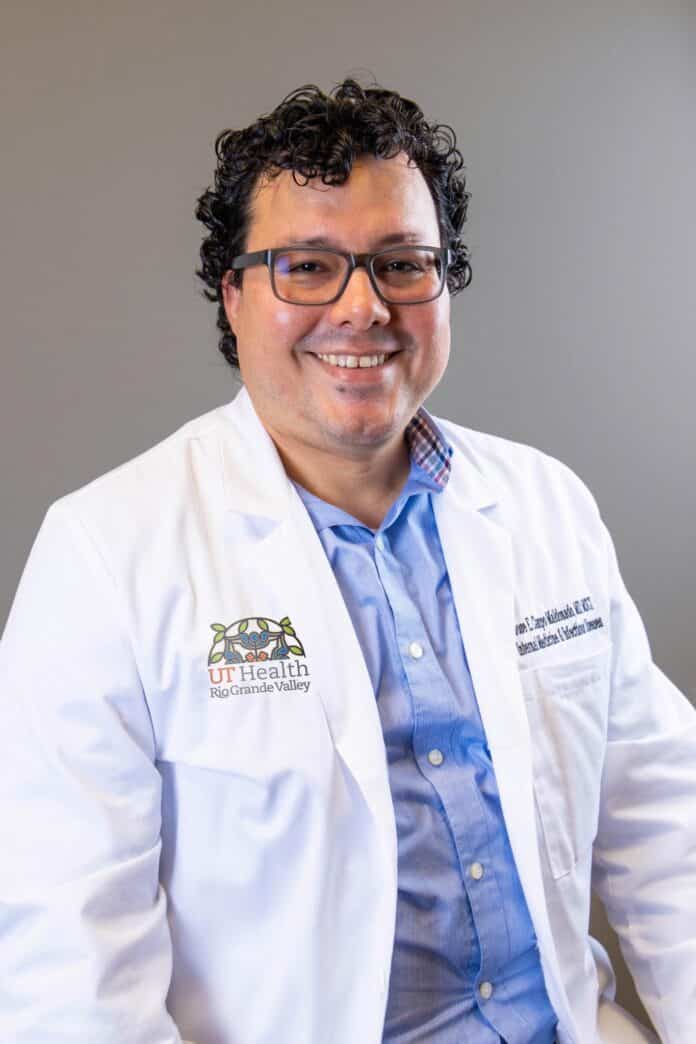HARLINGEN — “The Microbe Hunters” by Paul de Kruif details the fervent endeavors of such groundbreaking scientists as Louis Pasteur and Robert Koch.
Such is the same work pursued today in the time of COVID-19 by physicians like Dr. Jose Campo-Maldonado, infectious disease specialist at Valley Baptist Medical Center.
“I’m a member of the faculty at Valley Baptist Medical Center and their amazing program,” said Maldonado, 46.
“I work with the faculty here and residents,” he said. “I also participate in infection control and stewardship in Valley Baptist. When there are communications for physicians regarding appropriate use of antimicrobials or therapies for COVID-19 that are controversial, sometimes that’s part of what we do is inform the hospital community regarding those practices.”
Medicine seems to run in Maldonado’s family. One of his cousins is an infectious disease specialist in Houston, and another trained as a pulmonary doctor. His wife is an engineer, but she’s currently at home taking care of their 2-year-old daughter.
Maldonado began his pursuit of microbes while in medical school at the Universidad del Valle in his native city of Cali, Colombia. It was there he became interested in the “dynamics of infections.”
“We had a lot of mentors,” Maldonado recalled. “There were no IDs (infectious disease specialists). There were microbiologists that were teaching us, and some of them were also physicians and they were serving in the role of an ID doctor. They were very passionate and they would talk about infections because it was a developing country.”
During his tenure at Universidad del Valle — one of the four top universities in Colombia at the time — he saw many patients coming in from rural communities with Dengue fever, malaria and other ailments.
“I think I saw some of the HIV pandemic before the highly-effective antiretrovirals were available,” he said. “We had a lot of people coming into the hospital and getting very sick from respiratory failure. I remember feeling frustrated because we couldn’t do much for them.”
Those experiences, and the mentors who guided him, ignited his passion for microbiology and infectious diseases. That and the somewhat fickle nature of microorganisms and the way viruses tend to mutate. Case in point: the variants already emerging from COVID-19.
“We are millions into the pandemic and we’re seeing organisms change very rapidly,” he said. “So you can see that it’s a field that is always changing and it’s fascinating because of that. When you’re facing a challenging case in which you want to find out what’s going on, it’s a great stride forward.”
And he continues to move forward, now passing on his expertise to others.
“I am an assistant professor for UTRGV School of Medicine,” he said. “I am part of a committee for UTRGV which is the infectious disease committee which has to do with emergency response to situations like this. So I sit on that committee on a weekly basis to also provide expert opinion regarding what the university is doing with respect to the pandemic.”
He expressed concern about the COVID-19 situation in his native Colombia, where his parents and many other relatives reside.
“It’s pretty bad,” he said. “In my home city in the last few weeks, the COVID units are almost full and some of them are completely full. They have more limited health care infrastructure so less access to the type of care we have here.”
There is also less access to testing so he’s unsure of the accuracy of reported case numbers. Physicians and front line workers lack enough personal protective equipment.
“It’s a very difficult situation,” he said.
He noted there are also fewer opportunities for economic relief, sending many into deep financial distress.





